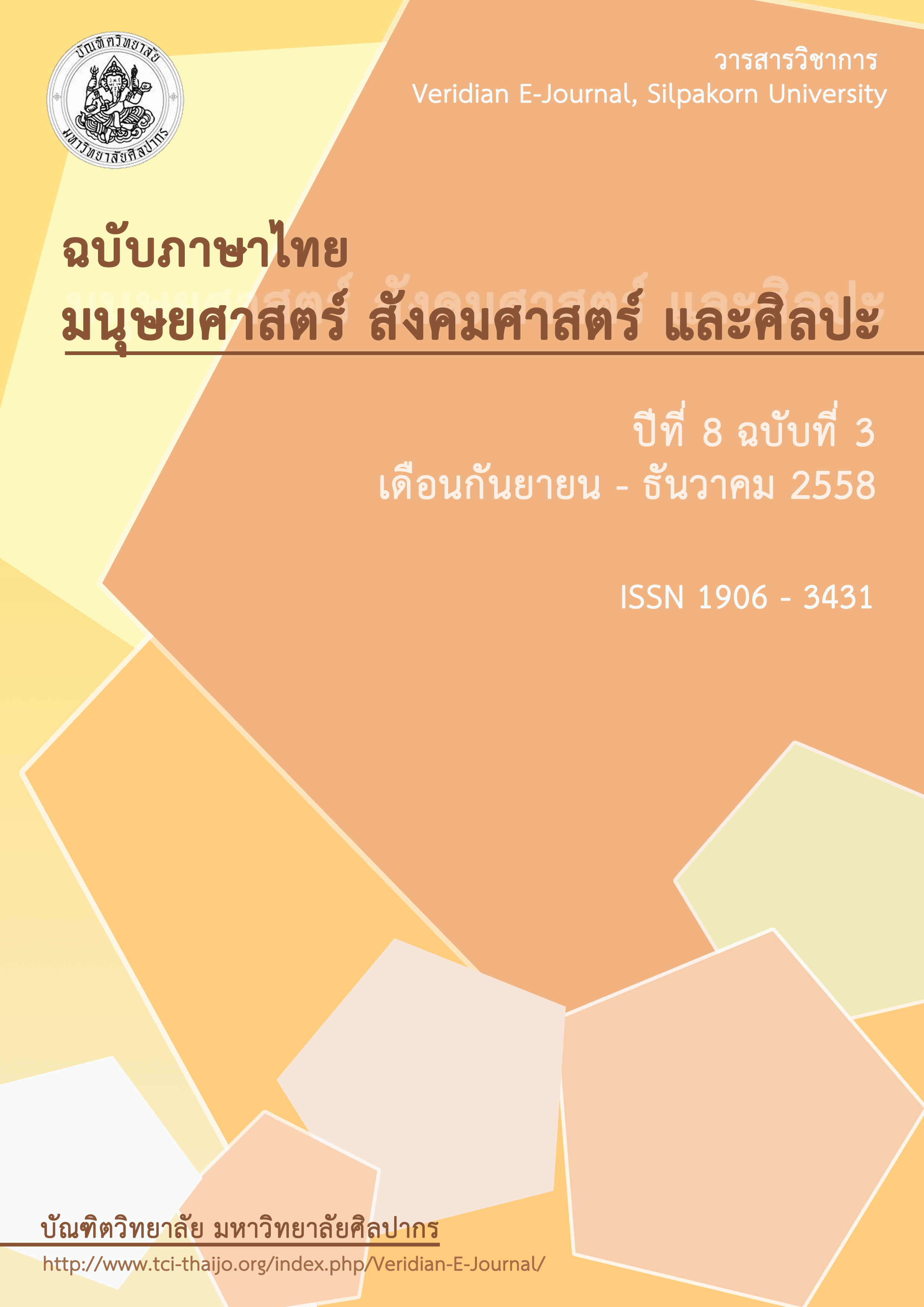ปัจจัยที่มีความสัมพันธ์กับพฤติกรรมการบริโภคอาหารนอกรั้วโรงเรียนของนักเรียน ในสังกัดสำนักงานเขตบางกอกน้อย กรุงเทพมหานคร
Main Article Content
Abstract
บทคัดย่อ
การวิจัยนี้มีวัตถุประสงค์เพื่อศึกษา 1) พฤติกรรมการบริโภคอาหารนอกรั้วโรงเรียนของนักเรียนและ 2) ปัจจัยที่สัมพันธ์กับพฤติกรรมการบริโภคอาหารนอกรั้วโรงเรียน โดยปัจจัยที่ศึกษา ได้แก่ ปัจจัยส่วนบุคคล ปัจจัยด้านครอบครัว และปัจจัยด้านสังคม กลุ่มตัวอย่างเป็นนักเรียนระดับประถมศึกษาชั้นปีที่ 4-6 ในโรงเรียน ในสังกัดสำนักงานเขตบางกอกน้อย จำนวน 321 คน ที่ได้จาการสุ่มแบบหลายขั้นตอน และใช้แบบสอบถามเป็นเครื่องมือในการเก็บรวบรวมข้อมูล สถิติที่ใช้ในการวิเคราะห์ข้อมูล ได้แก่ ความถี่ ร้อยละ ค่าเฉลี่ย ส่วนเบี่ยงเบนมาตรฐาน และสัมประสิทธิ์สหสัมพันธ์แบบเพียร์สัน
ผลการวิจัย พบว่า 1) นักเรียนมีพฤติกรรมและทัศนคติต่อการบริโภคอาหารนอกรั้วโรงเรียนอยู่ในระดับปานกลาง โดยนักเรียนหญิงมีพฤติกรรมการบริโภคอาหารนอกรั้วโรงเรียนมากกว่านักเรียนชาย ปัจจัยส่วนบุคคล พบว่า ผู้ตอบแบบสอบถามส่วนใหญ่เป็นเพศหญิงมีอายุเฉลี่ย 10 ปี เรียนอยู่ในระดับประถมศึกษาชั้นปีที่ 6 ได้รับเงินจากผู้ปกครองเฉลี่ย 87 บาทต่อวัน จ่ายค่าอาหารเฉลี่ย 57 บาทต่อวัน และค่าเครื่องดื่มเฉลี่ย 11 บาทต่อวัน สำหรับปัจจัยด้านครอบครัว ส่วนใหญ่บิดาและมารดามีการศึกษาอยู่ในระดับมัธยมศึกษาหรือเทียบเท่า และครอบครัวมีรายได้เฉลี่ย 16,452 บาทต่อเดือน ส่วนปัจจัยด้านสังคม พบว่า อิทธิพลของกลุ่มเพื่อนต่อการบริโภคอาหารของนักเรียนอยู่ในระดับปานกลางและวัฒนธรรมอาหารตะวันตกอยู่ในระดับมา2) ปัจจัยที่มีความสัมพันธ์กับพฤติกรรมการบริโภคอาหารนอกรั้วโรงเรียน พบว่า ระดับชั้นที่เรียน และเงินที่นักเรียนได้รับต่อวันมีความสัมพันธ์ทางลบกับพฤติกรรมการบริโภคอาหารนอกรั้วโรงเรียน ส่วนระดับการศึกษาของบิดา ทัศนคติต่อการบริโภคอาหารนอกรั้วโรงเรียน อิทธิพลของกลุ่มเพื่อน วัฒนธรรมอาหารตะวันตกมีความสัมพันธ์ในทางบวกกับพฤติกรรมการบริโภคอาหารนอกรั้วโรงเรียน ในขณะที่ อายุ ระดับการศึกษาของมารดา รายได้ของครอบครัว ค่าใช้จ่ายสำหรับอาหารและค่าใช้จ่ายสำหรับเครืองดื่มไม่มีความสัมพันธ์กับพฤติกรรมการบริโภคอาหารนอกรั้วโรงเรียน
Abstract
It seems that having after-school diet is a schoolchildren behavior of concern, particularly in primary schoolchildren. This research examines 1) after-school dietary behavior of primary school students and 2) factors relating to their after-school dietary behavior. Personal, family, and social factors were studied. Using multi-stage sampling technique, a sample size of 321 primary school students in grades 4-6 of schools under Bangkok Noi District responsibility were randomly selected. Questionnaires were used to collect data, and the statistics used for data analysis were frequency, percentage, mean, standard deviation, and Pearson’s correlation coefficient.
It was found that student’s after-school dietary behavior and attitude were moderate. Girls had after-school diet more than boys. For personal factors, most students were female, average age of 10, and in Grade 6. On average, the students received pocket money from their parents of 87 baht/day, spent on food of 57 baht/day, spent on beverage of 11 baht/day. For family factors, most of their parents’ qualification was a secondary school certificate or equivalent, and with an average monthly family income of 16,452 baht. With regard to social factors, influences of peer and western food culture on their dietary behavior was moderate and high, respectively.
The research findings revealed that, the grade attended and the pocket money received were negatively correlated with their after-school dietary behavior. Fathers’ qualification, their attitude towards after-school diet, influences of peer and western food culture were positively correlated with their after-school dietary behavior; while age, mothers’ qualification, family income, and food and beverage expenses were not correlated with their after-school dietary behavior.

